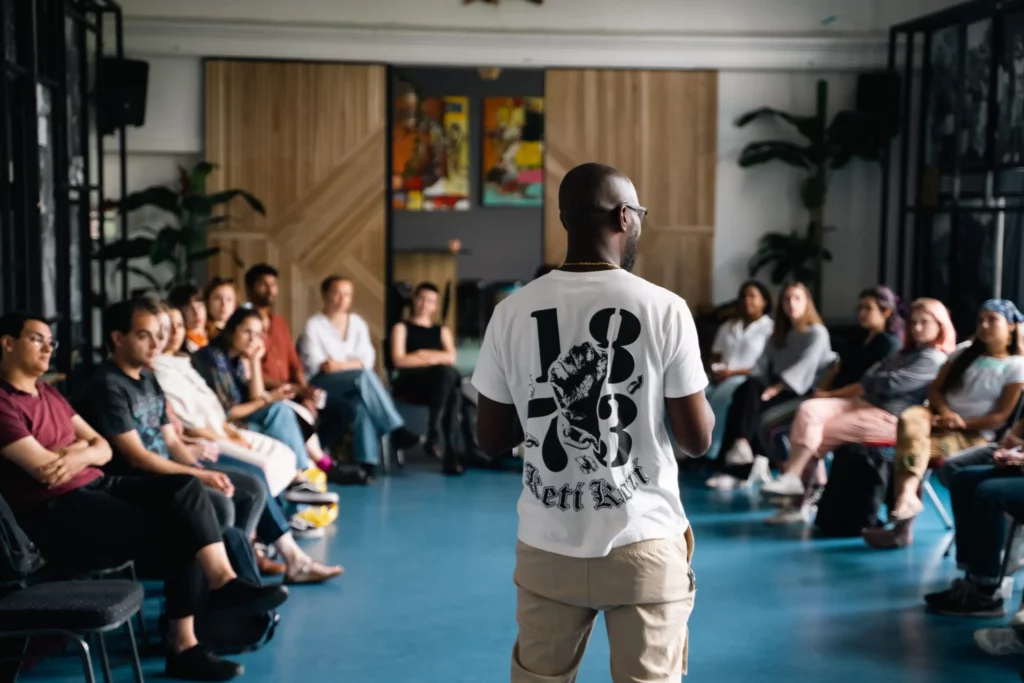
The Humanity in Action Fellowship program creates a space for Fellows to build a community and delve into learning about social justice, the politics of memory, and civic engagement from both a structural and personal lens. Local experts, museum visits, workshops, and collaborative reflection shape the fellowship’s rich learning experience over the 4-week program. After the in-person component of the program, Fellows continue to use their learnings and implement “action projects” with the support of monthly “action lab” sessions.
David Schupp completed his fellowship in Berlin and Amsterdam, where he joined a vibrant cohort of fellows from many different backgrounds. In this interview, he shares reflections on his fellowship journey, connecting with a community of like-minded and socially engaged fellows, his exciting project on environmental racism, and how this experience shaped his professional trajectory.
Interested in applying for the Humanity in Action Fellowship? Sign up for a free ProFellow account and bookmark it today.
Tell us about your background and professional journey. What led you to the Humanity in Action Fellowship?
As an Afro-German living in Germany and the son of a mother who sought refuge from war, I’ve developed a profound understanding of the essence of equity. Throughout my schooling, I felt a palpable sense of injustice, but I lacked the vocabulary and theoretical frameworks to articulate it.
My undergraduate education, however, became a pivotal turning point. It was not solely the courses on racism and migration that sparked my interest, but the opportunity to actively engage within the university structure to combat discrimination. It was during this period that I co-founded a university group focused on creating a safer space for students subjected to racism. My co-founders were past fellows of Humanity in Action. They shared their enriching experiences and encouraged me to apply as well.
In 2020, I resolved to broaden my advocacy efforts beyond the student environment to make a more significant impact on society as a whole. Therefore, I started to work with Vielfaltsprojekte GmbH which works towards the vision of a discrimination-free society. After gaining valuable insights through shadowing and leading initial workshop sessions, I began to facilitate workshops on diversity, discrimination, and anti-racism.
For me, learning is a perpetual process. Thus, the desire to further educate myself and learn from experts, activists, and scholars beyond the university setting motivated me to apply for the Fellowship. This opportunity offered the perfect platform to expand my knowledge base and network with dedicated individuals who share the same zeal for justice.
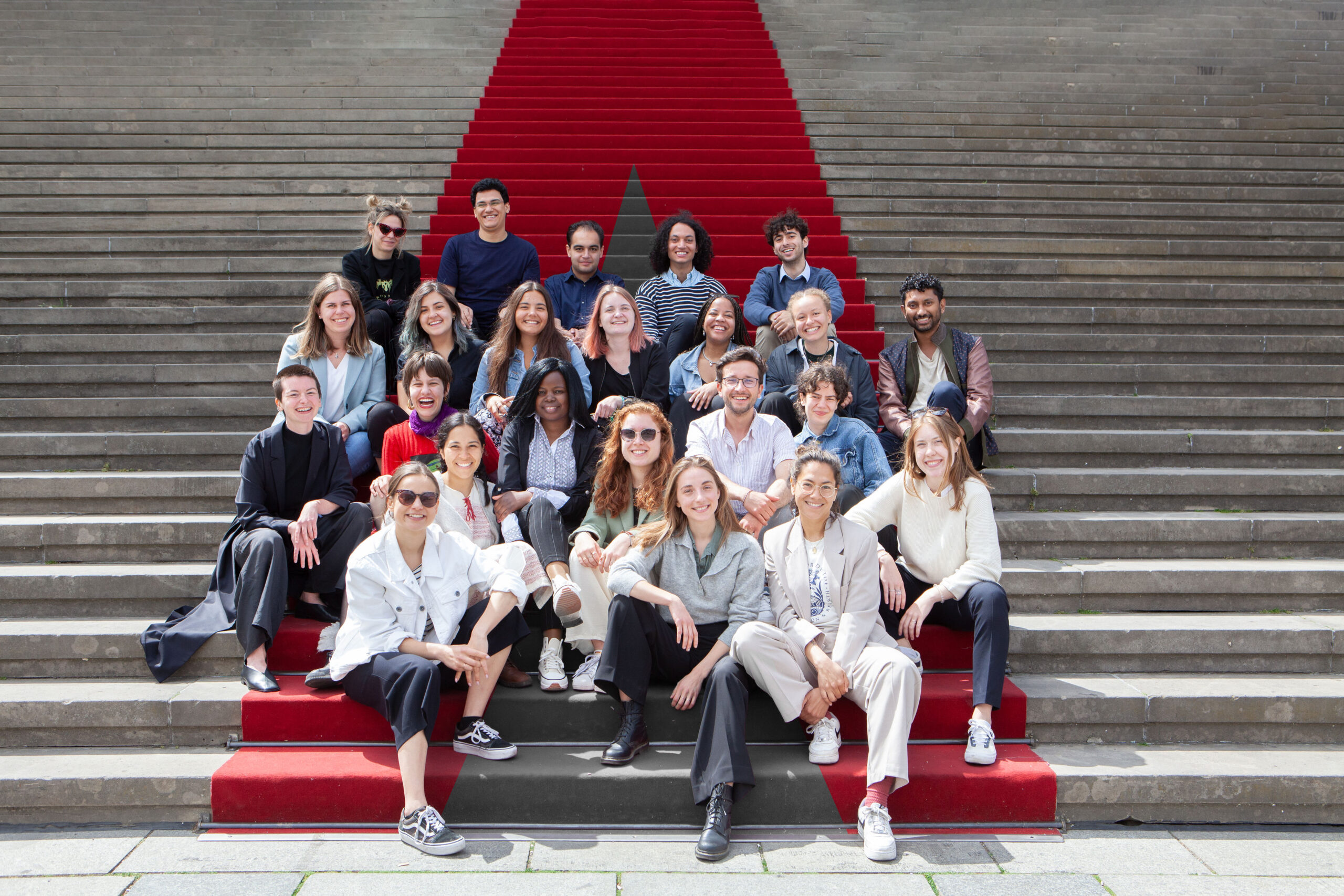
There are several Humanity in Action Fellowship programs tailored to the cities where they take place – could you elaborate on your personal experience in the Fellowship and what a typical week looks like for a Fellow?
Firstly, I am incredibly grateful to those who introduced and recommended me for the Humanity in Action Fellowship. My sincere thanks to the Humanity in Action organization for such a profound and transformative program that has not only enriched my understanding but also led to friendships. I want to extend a special mention to the dedicated teams at the Berlin and Amsterdam offices for their unwavering support and commitment, without whom this journey would not have been possible.
I was fortunate to participate in the European Fellowship, a program conducted in Berlin and Amsterdam. This was the first time Humanity in Action implemented the program across two countries, enriching our understanding of social issues from a broader perspective. Our discourse largely revolved around the extent of Germany’s responsibilities concerning its National Socialist and colonial past. Furthermore, we learned the significance of our history and how we should engage with it in the present.
Spanning over four weeks, the Fellowship program took us through a journey in these two cities. After that, we continued to work on implementing our own action projects, which I’ll talk about later. While it’s challenging to distill weeks of diverse experiences into a few lines, I’ll touch upon some events that particularly resonated with me. For further detailed information about the Fellowship, I suggest checking out the website of Humanity in Action.
We had workshops, lectures, museum visits, walking tours, and an international conference. Each day, we delved into a specific topic, broken down into two sessions and interspersed with small group discussions and reflections.
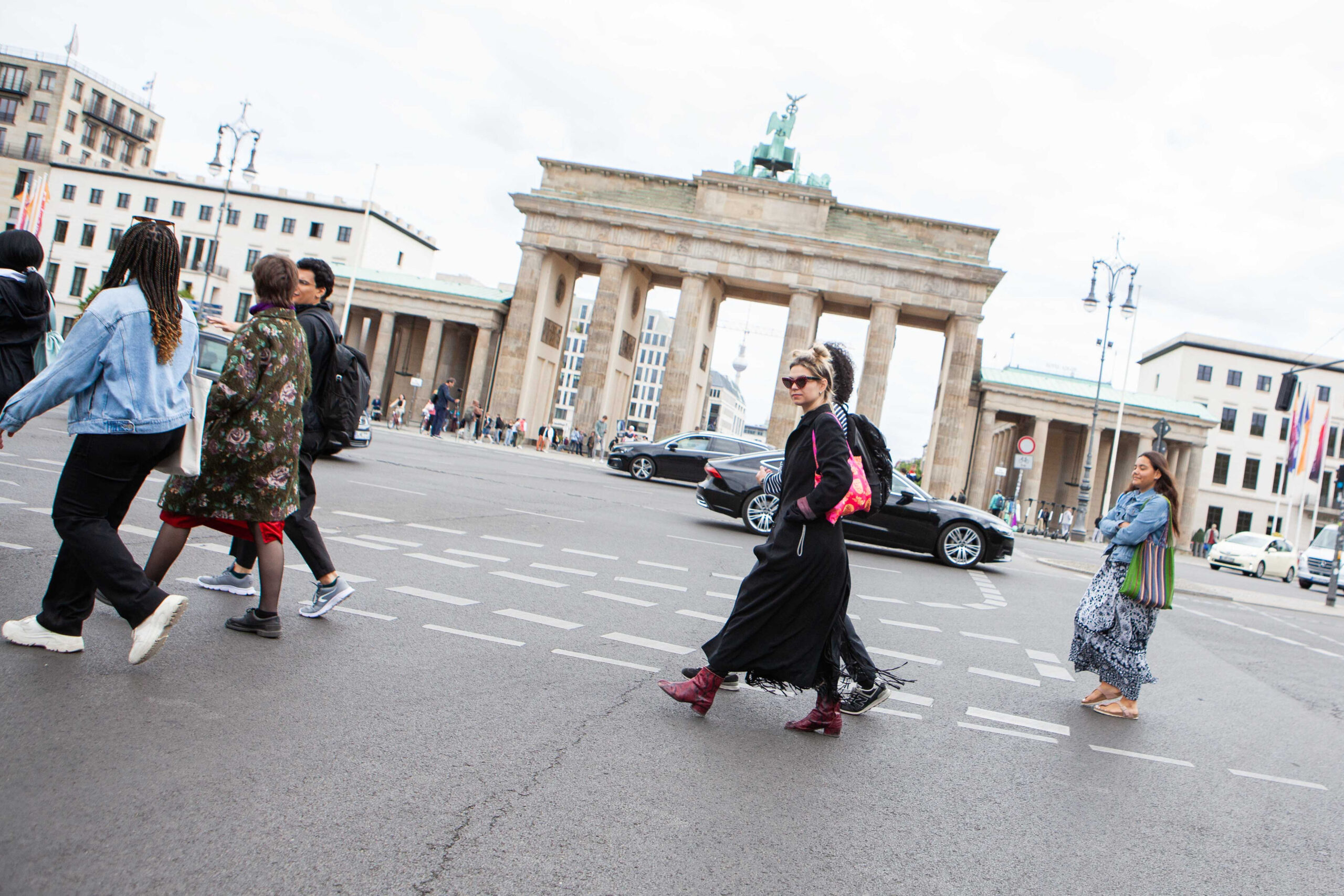
The first highlight was our tour through one exhibition of the Humboldt Forum, a controversial ethnological museum in Berlin. This tour, led by Fogha Mc Cornilius Refem, a Senior Fellow from the previous cohort, critically reflected on the history of the exhibits, German colonialism, and positionalities. In the context of these discussed topics, I can recommend watching Fogha Mc Cornilius Refem’s video on human zoos. The experience was a potent catalyst for thought, leading us to share our individual interpretations and insights. In fact, it was an unofficial Senior Fellow tour, and in that sense, we already got to know the value of the Senior Fellow Humanity in Action community.
One of the Fellowship’s central learnings for me was the connection and the continuities of German colonialism and the Holocaust. Especially which impact and consequences have continued to the present day. In this context, I particularly remember the tour of an eminent human rights activist and political scientist through the African quarter in Berlin. We learned how Black people were inhumanely treated and portrayed like animals in zoos. We touched upon the recent debates on the renaming of street names with a racist history.
Further, we delved into the less-discussed topics of national socialist German history: the forced labor camps. They were visibly located in the city amidst residential areas, yet their existence was often ignored. The camps were segregated according to people’s backgrounds and hence had different “rights” or rather treatments. In this context, I learned that the majority of German companies profited from such camps, and at the same time the victims were only compensated at the end of the 1990s.
Lastly, I want to share my experience learning about the Holocaust in the Dutch context. The Fellowship program also discussed the Holocaust in Germany, but learning about the Dutch context was a new perspective on the subject for me personally. I expanded my knowledge of the persecution of Jewish people. In this regard, we visited the poignant Holocaust Names monument in Amsterdam. From above, it displays the Hebrew letters “לזכר”, translating to “in memory”. Each brick bears the name of a victim deported from Amsterdam and the top mirrors the surroundings and yourself. I found the interpretation of reflecting oneself as well as one’s surroundings onto the monument to be particularly significant.
The Humanity in Action Fellowship offers a space to explore issues around social justice, human rights, and civic engagement in the context of societal dynamics and structural challenges. How did this mission spark your interest and the learning environment with your co-fellows?
While I had previously engaged with communities experiencing racial discrimination, the opportunity to collaborate with like-minded individuals from diverse backgrounds and myriad positionalities within the Fellowship program was truly inspiring. My cohort fostered a sense of community, offering a nurturing space for reflection, learning, and connection.
One of the key aspects of the program involved transitioning from learning to active implementation of our own action projects. In this sense, I am grateful to have connected with another fellow to work together on a project dedicated to raising awareness about environmental racism. Therefore, we started a project called plat.era – a platform about environmental racism. Soon we will launch our website, but until then you can follow our work on Instagram @plat.era!
After the in-person program, we continued to refine our action projects through monthly ‘action lab’ sessions. These sessions were designed to provide valuable insights on various topics, such as utilizing social media effectively or ensuring well-being during activism. These experiences played a crucial role in guiding our action projects.
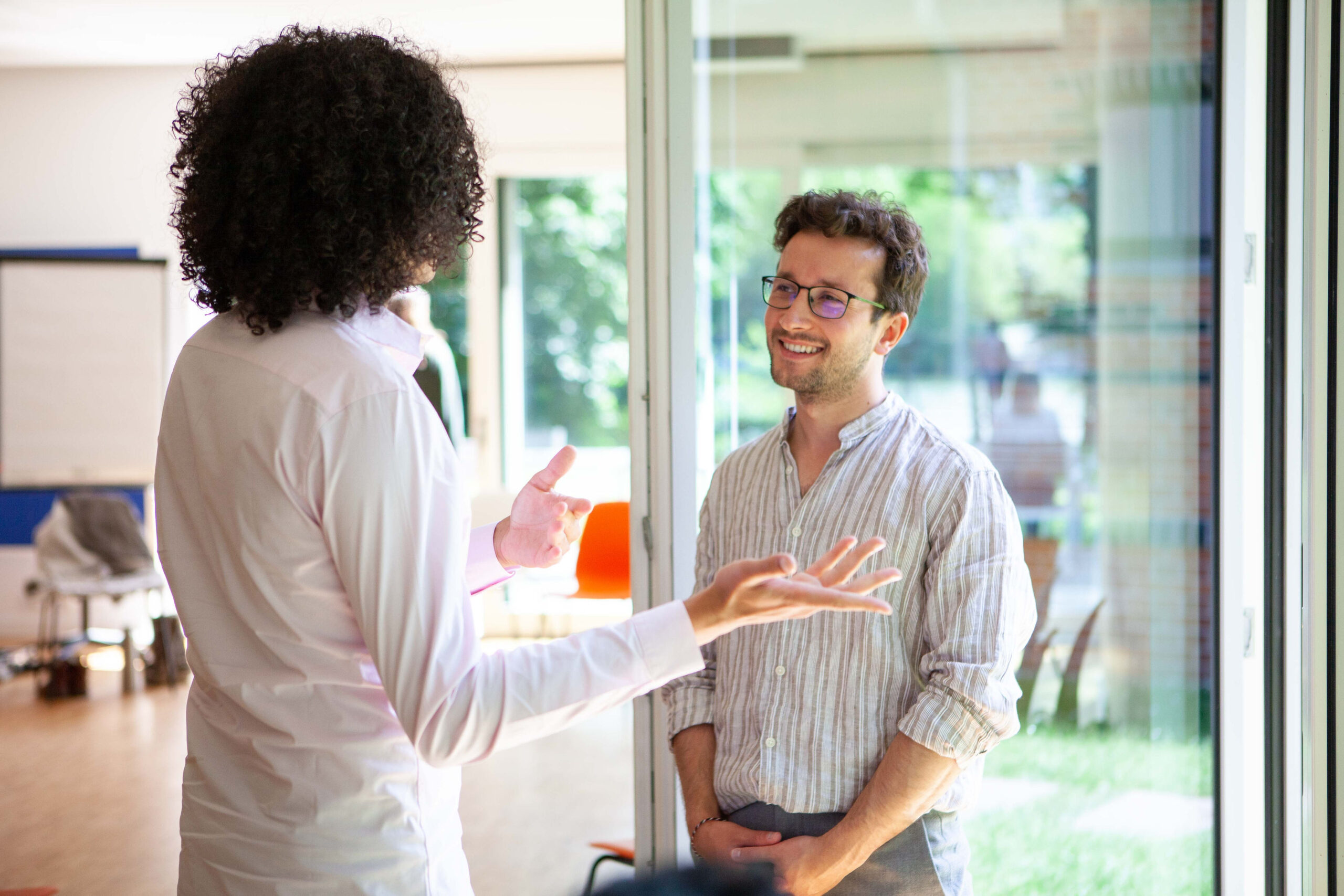
How did this opportunity allow you to advance your career?
The knowledge and experience gleaned from the Fellowship have been invaluable, both in my academic pursuits and professional sphere. I have been able to incorporate the insights gained from the Fellowship into my workshops, thereby contributing to my goal of working toward a discrimination-free society. Specifically, this opportunity has enhanced my understanding of structural injustices, forming a solid foundation for my work.
For instance, I embedded the new knowledge I gained from the walking tour in the African quarter in Berlin and other aspects of the program. I could point out specific racist history in Berlin and overall continuities throughout Germany.
After our Fellowship, one fellow offered me the opportunity to support him as a neutral representative, ensuring fairness and addressing any concerns that may arise. This experience, coupled with my involvement in a seminar and volunteering at an international conference on African Studies, has enriched my academic understanding. I learned how a conference is organized and strengthened my project management and event planning skills. Additionally, I was introduced to new scientific discourses like future studies.
The network that the Fellowship provided me with is priceless. To be a part of a community of like-minded individuals committed to social justice, and knowing that together, we can make impactful projects a reality, is truly empowering.
Furthermore, the Fellowship acted as a career springboard for some of my fellow participants. For instance, one of them learned about a vacant PhD position through the Fellowship that perfectly aligned with his aspirations, and he successfully secured this opportunity. The Fellowship serves as a rich platform for career advancement and network expansion.
Ready to start your application? Our guide on how to write a fellowship application essay will get you through the first steps.
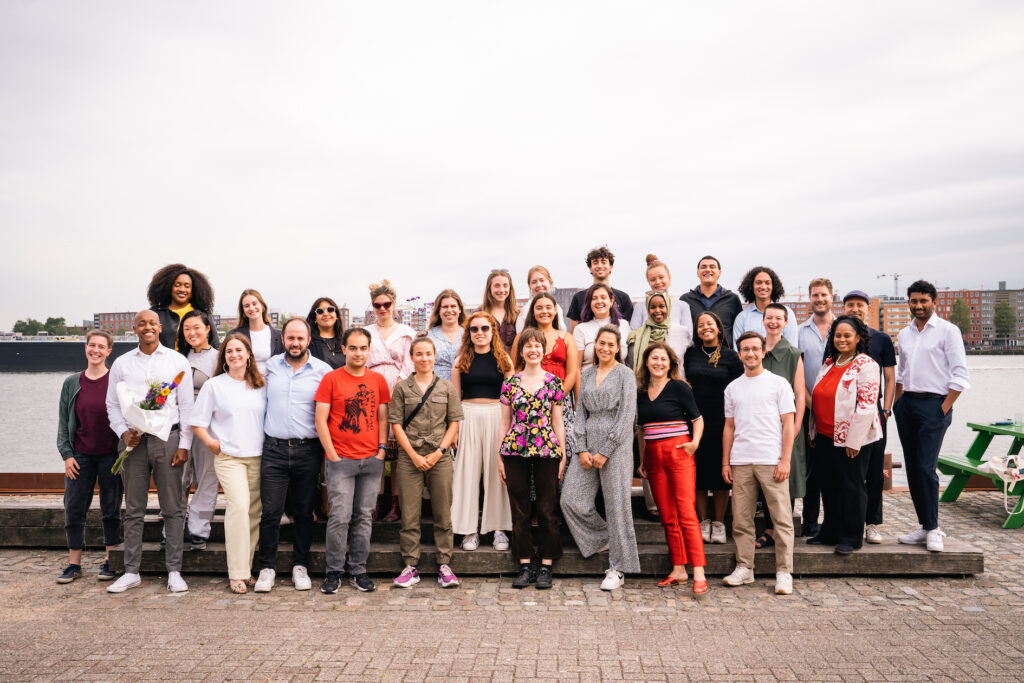
What advice do you have for others applying for the Humanity in Action Fellowship?
I urge every prospective fellow to present their best self, and more importantly, to not hesitate in submitting an application.
Thoroughly acquainting yourself with the Humanity in Action organization, its mission, and the nuances of the various fellowships is crucial. Each fellowship has a unique focus and being aware of these can help you align your interests effectively. If your work or research already intersects with the Fellowship’s themes, don’t hesitate to showcase this.
The cohorts are diverse, comprising individuals with varying positionalities, professional experiences, and academic backgrounds. Don’t let uncertainty deter you. Reach out to the organization’s offices or attend informational video calls to get a clearer understanding of what the Fellowship entails.
Interested in finding many more opportunities like the Humanity in Action Fellowship? Sign up for the ProFellow database, which includes more than 2,500 funded opportunities for professional development and graduate school.
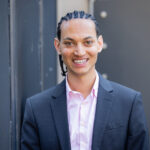
David Schupp stands as a Senior Fellow of the Humanity in Action European Fellowship 2022 cohort and as a 2023 Fellow of the Politics Academy of Diversity. He began his academic journey at the University of Passau, earning a BA in Governance and Public Policy. He is completing a MA in Social Science at Ruhr-University Bochum. Currently, he is working diligently as a Project Coordinator at a diversity consultancy.
© 2023 ProFellow, LLC, all rights reserved.